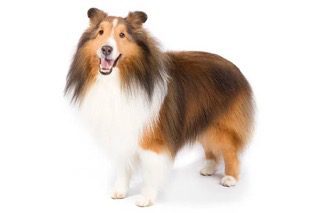
The Shetland Sheepdog, also known as a Sheltie, is an active and loyal herding dog originating from the Shetland Islands of Scotland. They were bred for the purpose of herding local sheep and ponies as well as protecting the family’s smallholdings. Shelties have a long, smooth double coat that consists of a long, thick, water-resistant outer coat and a soft, dense undercoat. Their fur is often straight with feathering on the chest, legs and cheeks. Shelties can be found in a variety of color combinations, such as sable and white, blue merle, and tricolor. Commonly used breeds to create the Sheltie are: the Collie, the Scandinavian Spitz, and the Icelandic Yakkin. What really stands out about the Sheltie is their lively, soft manner and how gentle and devoted they are to their family. They are considered to be highly intelligent, have a knack for learning new things, and flourish when given a job to do. Shelties are perfect companions for those who enjoy training and active outdoor adventures.
The Shetland Sheepdog is an incredibly friendly and gentle breed, with an intelligence that allows them to learn quickly and be eager to please their owners. They are highly patient and tolerant, and typically get along well with children and other pets in the household. Early training and socialization will help ensure that they grow into well-mannered adults. They need plenty of exercise, despite their small size, and thrive when taken for daily walks, runs, and playtime. Shelties can be kept indoors but do need plenty of activity to stay happy. Generally, they are fairly quiet, only barking when necessary. They have the capacity to form deep bonds with their owners and are very loyal dogs.
The Shetland Sheepdog is a small-to-medium sized herding dog that has a medium to high energy and requires lots of exercise and physical activity. They require a well balanced diet of protein, carbohydrates, and fats in order to maintain a healthy weight and overall wellness. A high quality dog food that is grain-free and has a balanced combination of nutrients is recommended. Owners should offer the appropriate amount of properly portioned food for their Shetland Sheepdog’s size and activity level. Treats and table food should be avoided and fresh, clean water should be available at all times. When it comes to eating, it is important for the owner to establish mealtimes and stick to a routine. A healthy and balanced diet is necessary for a long and healthy life for a Shetland Sheepdog. Responsible ownership and adoption are important for the well-being of the Shetland Sheepdog. If you think this breed is a good fit for you, we recommend visiting Way Canina to learn more about the breed and to find out what food is okay for them to eat and what foods to avoid. A balanced and nutritional diet can provide a life full of energy and activity for your Shetland Sheepdog.
The Shetland Sheepdog is a healthy breed with few health concerns. They are predisposed to certain genetic problems such as hip dysplasia, eye issues, and skin problems. It is important to ensure your Shetland Sheepdog is up-to-date on all their vaccinations and to keep up with regular veterinary visits for preventive care. Grooming for the Shetland Sheepdog is relatively easy and should include brushing and bathing regularly along with cleaning their ears. A balanced diet with the right proportions of protein, carbohydrates and fats is important for a healthy and long life. The Shetland Sheepdog should also get plenty of exercise to prevent any obesity-related problems.
Shetland Sheepdogs typically live for 12 to 14 years although with proper care and a great diet, they can live up to 16 years or longer.
Are you considering getting a Shetland Sheepdog? Owning any breed of dog is a big commitment and comes with its own set of pros and cons. Before taking the plunge, we recommend that you check out our blog posts and articles on Way Canina to compare different breeds and learn more about dogs’ lifestyles and wellbeing. Doing so will ensure that you make an informed decision and find a pup that best fits your needs!